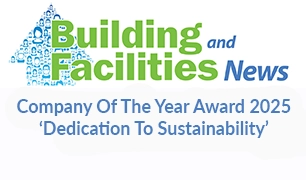COP26 is now well underway with cautious optimism over initial agreements on reducing coal, global methane levels and rates of deforestation. But what does the event mean currently for those focussed on buildings in the commercial sector here in the UK?
Firstly, more than 40 nations representing over 70% of the world’s economy and every region have stated they will commit to ‘turbo-charging’ the uptake of clean technologies by imposing worldwide standards and policies at COP26. The five sectors that the plan will cover at first are steel, road transport, agriculture, hydrogen, and electricity, with the intent of encouraging global private investment in low-carbon technologies. The aim is to draw in trillions of dollars in private finance for cutting emissions, and businesses seeking to export into the EU must reach the same standards, so we can expect this to strongly impact the UK.
The Treasury has also outlined at COP26 new sustainability disclosure requirements (SDR) for large UK businesses. Under these new Treasury rules, financial institutions and companies with shares listed on the London Stock Exchange must come up with net-zero transition plans, which will be published from 2023. These net zero transition plans and sustainability claims must be ‘clearly’ justified to set a science-based ‘gold standard’. The government will set up a Transition Plan Taskforce of industry leaders, academics, regulators and civil society groups. The strategies will need to include targets to reduce greenhouse gas emissions, and steps that firms intend to take to get there. However, the government has admitted there is “not yet a commonly agreed standard for what a good quality transition plan looks like”, and the UK was not “making firm-level net zero commitments mandatory”.
450 firms managing banks, insurers and pension funds controlling 40% of global financial assets – equivalent to £95tn – have though aligned themselves to limit global warming to 1.5C above pre-industrial levels. Such private investment in green technologies over brown investments is vital in the march towards net zero by 2050. An example of this was the announced “Breakthrough Energy Catalyst” programme at COP26, which aims to raise up to $30bn of investments and bring down costs for ‘green’ hydrogen, direct air capture of CO² and long-duration energy storage.
But there still remain unanswered questions over what government support for the commercial sector is going to look like, and when it will materialise? Non-mandatory regulation changes and dependence on private finance to green economic trajectory in the hope that businesses will decarbonise of their own accord remains questionable, especially outside the realms of big business.
At the start of 2021, there were 5.5 million small businesses that account for 99.9% of the business population (5.6 million businesses) in the UK according to the National Federation of Self Employed & Small Businesses. These companies’ buildings continue to generate a considerable proportion of UK emissions, so further support for them is critical. In the coming week, delegations will try to further raise awareness of the need for greater support if building emissions are to be successfully addressed.
Efforts to achieve large scale decarbonisation of buildings have focussed on new builds and recognising a building’s full lifecycle in terms of its carbon cost. But consider this, 97% of EU buildings are in need of renovation, so tackling existing properties must be addressed, only then can a more holistic carbon plan be put in place to support commercial properties to be more energy-efficient and able to support low carbon hot water and heating. This would not only address issues of embodied and emissive carbon but could help reduce air pollution and contaminants that, according to the World Health Organisation (WHO), contribute to the deaths of 120,000 Europeans a year. This issue is raised in an open letter to those attending COP26 from trade bodies that include the European Heat Pump Association amongst others, calling for action on appropriate air quality, thermal comfort, control and automation systems within buildings.
Read about how Adveco can help support your business to improve the sustainability of its’ buildings through our range of low carbon and renewable hot water applications.
 For further information on how to reduce carbon in commercial buildings and on net zero water heating, call Adveco on 01252 551 540 or use our contact form.
For further information on how to reduce carbon in commercial buildings and on net zero water heating, call Adveco on 01252 551 540 or use our contact form.
















